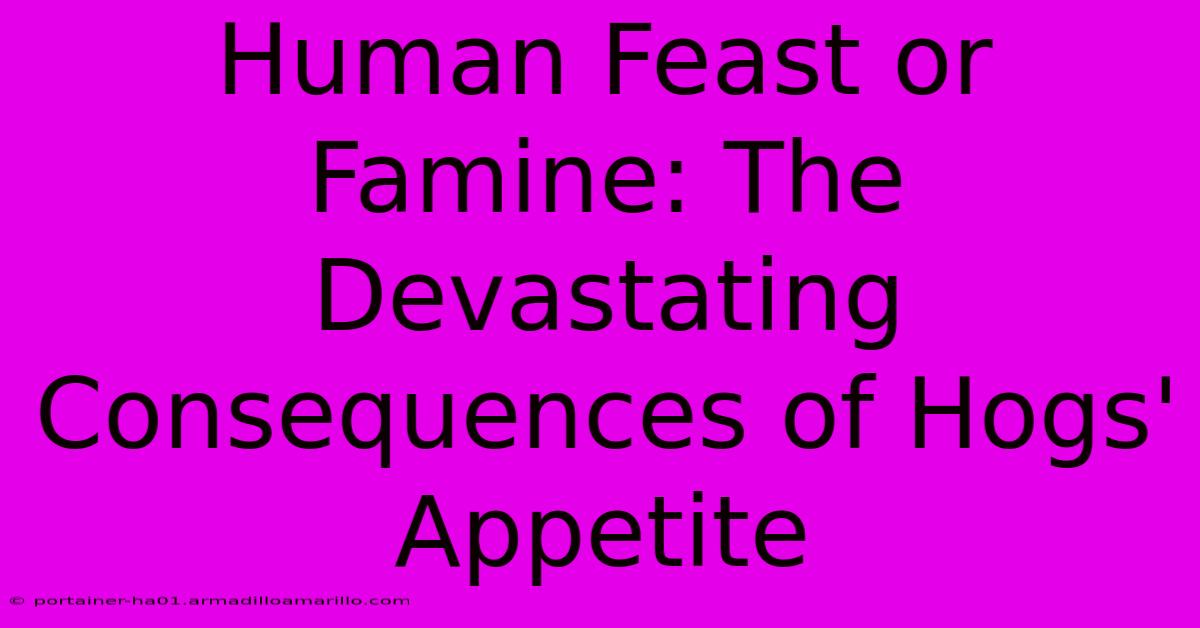Human Feast Or Famine: The Devastating Consequences Of Hogs' Appetite

Table of Contents
Human Feast or Famine: The Devastating Consequences of Hogs' Appetite
The insatiable appetite of the global hog industry is creating a devastating paradox: a feast for some, and famine for many. While providing a crucial source of protein for billions, intensive hog farming is contributing significantly to environmental degradation, social inequalities, and food insecurity. This isn't simply about individual choices; it's a systemic issue demanding critical examination and sustainable solutions.
The Hog Industry's Environmental Footprint: A Hogwash of Problems
The environmental consequences of industrial hog farming are staggering. Consider these key factors:
- Water Pollution: Hog waste, containing high levels of nitrogen and phosphorus, contaminates water sources, leading to algal blooms, dead zones, and unsafe drinking water. This pollution disproportionately impacts communities located near factory farms.
- Greenhouse Gas Emissions: Hog farming is a significant contributor to greenhouse gas emissions, particularly methane, a potent greenhouse gas. The sheer scale of industrial operations amplifies this impact, accelerating climate change.
- Deforestation and Habitat Loss: The demand for soy and corn to feed hogs drives deforestation, particularly in the Amazon rainforest, leading to biodiversity loss and habitat destruction. This contributes to climate change and threatens countless species.
- Antibiotic Resistance: The widespread use of antibiotics in industrial hog farming contributes to the growing problem of antibiotic resistance, a serious public health threat. This makes treating bacterial infections in humans increasingly difficult.
The Hidden Costs of Cheap Meat
The price of cheap pork often masks the true cost of its production. Externalized costs, such as environmental damage and public health consequences, are not reflected in the market price, leading to a distorted economic system that undervalues sustainability. This system favors profit maximization over long-term ecological and social well-being.
Social Injustice and Food Insecurity: A Bitter Pill to Swallow
The hog industry's impact extends beyond environmental concerns. It exacerbates social inequalities and contributes to food insecurity in several ways:
- Community Displacement: The establishment of large-scale hog farms often leads to the displacement of local communities, impacting livelihoods and cultural heritage. The environmental consequences further limit their access to clean water and fertile land.
- Unequal Access to Resources: The concentration of wealth and power within the hog industry limits access to resources for smaller farmers and marginalized communities, hindering their ability to participate in the food system.
- Food Sovereignty Issues: The dominance of industrial hog farming undermines local food systems and traditional farming practices, reducing food diversity and increasing vulnerability to global market fluctuations. This impacts food security, particularly in developing countries.
Beyond the Plate: Rethinking Our Consumption
Our consumption habits are directly linked to these devastating consequences. Demand for cheap meat drives the unsustainable practices of industrial hog farming. We need to shift our focus from quantity to quality, prioritizing sustainable and ethical sourcing.
Towards a Sustainable Future: A Call for Change
Addressing the negative impacts of the hog industry requires a multi-faceted approach:
- Sustainable Farming Practices: Promoting sustainable hog farming practices, such as pasture-raised systems and reduced antibiotic use, is crucial for mitigating environmental and social impacts.
- Policy Changes: Governments need to implement policies that incentivize sustainable farming practices, regulate pollution, and address the externalized costs associated with industrial hog farming.
- Consumer Awareness: Raising consumer awareness about the environmental and social consequences of their food choices is essential to driving demand for sustainable products.
- Dietary Shifts: Reducing meat consumption, particularly of industrially produced pork, and diversifying diets can significantly reduce the environmental footprint of our food systems.
The future of food security and environmental sustainability is inextricably linked to the future of the hog industry. We must move beyond a system that prioritizes profit over people and planet, and embrace a more equitable and sustainable approach to meat production and consumption. The choice is ours: a feast for a few, or a sustainable future for all.

Thank you for visiting our website wich cover about Human Feast Or Famine: The Devastating Consequences Of Hogs' Appetite. We hope the information provided has been useful to you. Feel free to contact us if you have any questions or need further assistance. See you next time and dont miss to bookmark.
Featured Posts
-
Unlock Your Font Potential Tt Chocolates Demibold The Key To Typographic Perfection
Feb 07, 2025
-
The Bulls Logos Upside Down Saga A Tale Of Power Pride And Occult Intrigue
Feb 07, 2025
-
Beauty Unveiled Dive Into The Tropical Dreamscape Of Dnd Coconut Silk
Feb 07, 2025
-
Horrifying Revelation Are Wild Hogs Lurking Predators Of Humans
Feb 07, 2025
-
Diy Cat Eye Nail Art Create A Bejewelled Masterpiece From Home
Feb 07, 2025
